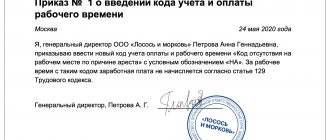After receiving pension status, most people prefer to continue working - these are the realities of today. Elderly employees have behind them knowledge, experience, qualifications and other “riches” that come with years. Unfortunately, these often include health problems, which means private sick leave. A worker of retirement age does not always want and can adapt to changing requirements or learn new skills; there are difficulties regarding personal relationships in the work team, especially if he has to obey a young boss.
There are plenty of reasons why an employer would want to see such an employee retire. But what if the employee sees it differently? How to comply with the dismissal procedure on legal grounds, without discriminating against the dismissed person based on age?
If a retired employee himself wants to resign, then he just needs to submit an application for dismissal due to retirement
What are the advantages of pensioners
According to the provisions of the current Labor Code, pensioners are equal in rights and responsibilities to all other employees (Article 3 of the Labor Code of the Russian Federation).
But in some cases, retirement age guarantees certain benefits at work.
- According to the law, age cannot be a reason for refusal of employment (Article 64 of the Labor Code of the Russian Federation).
- A retired WWII veteran, if he continues to work, can choose the time for his vacation (Clause 1, Article 15-16 of Federal Law No. 5 of January 12, 1995).
- If desired, an employee of retirement age can take additional unpaid leave of up to 14 days.
- Working pensioners are exempt from paying property tax.
- Older employees receive certain preferences when purchasing vouchers to sanatoriums and other health institutions.
It is important to know what mistakes to avoid with retired employees
Privileges and guarantees
When carrying out the procedure for downsizing or liquidating a company, persons receiving state subsidies are entitled to privileges. The employer must provide pensioners with the following guarantees:
- do not discriminate against individuals based on age, provide equal rights to work for older citizens compared to younger employees;
- take into account the qualifications, experience, knowledge and skills, high labor productivity of a pensioner when determining the list of employees subject to personnel reduction;
- provide additional unpaid leave out of turn for up to 2 weeks to a person receiving old-age benefits, upon his request;
- pay all subsidies established by the state when the number of workers in the company is reduced;
- do not force a pensioner to work for the required 2 weeks if the citizen decides to resign of his own free will.
Preemptive right to remain on staff of the enterprise
According to the provisions of the Labor Code of the Russian Federation, an employee receives an advantage when remaining in his position during the procedure for optimizing production at the enterprise, if he is highly qualified and performs duties in accordance with the provisions of the employment agreement. If a person of retirement age is actively working in production and his work is highly productive, then the company management must take these factors into account when compiling a list of employees to be laid off.
- 5 best holiday agencies in Moscow
- 7 Ways to Lower Cholesterol After 50
- 7 unexpected situations for a driver to receive a fine
Which pensioners are prohibited by law from being laid off?
People belonging to socially unprotected categories of citizens who have served the Russian Federation and the enterprise have the right to remain in their previous position while minimizing the size of the company for objective reasons. These include the following Russians receiving a pension:
- those who took part in battles on the battlefields of the Great Patriotic War (WWII);
- those who received injuries in the Second World War that led to disability;
- having disabilities due to participation in other battles in hot spots;
- injured during work, but able to perform job functions in accordance with the provisions of the employment agreement;
- providing for minor dependents;
- falling under the definition of a privileged group that is not subject to reduction, in accordance with the provisions of the collective agreement;
- who are guardians of minor children, provided that they are the only employed family members.
Age is not a reason for dismissal
No matter how much an employer would like to fire a retired employee in order to get rid of certain difficulties and make room for younger employees, the law does not allow this.
Dismissal due to retirement is not provided for by law as a separate basis for dismissal. An employee retiring may resign of his own free will on the date specified in the application. The dismissal procedure is standard
Art. 3 of the Labor Code of the Russian Federation clearly states that retirement age cannot in any case be a reason for dismissal.
IMPORTANT INFORMATION! Any insufficiently justified reason for dismissing a pensioner in court in most cases will be regarded as age discrimination, which is fraught with serious consequences for the employer.
Of course, there are many ways in a manager’s arsenal to force someone to write a statement “of their own free will.” But if the pensioner actually does not have such a desire, but has the determination to defend the violated rights, then in court the employer looking for easy ways is practically doomed.
FOR YOUR INFORMATION ! The wording “at their own request” in relation to employees of retirement age is appropriate only if there is their good will. In this case, they can do without the obligatory warning for everyone 2 weeks before leaving (Article 80 of the Labor Code of the Russian Federation). They can exercise this right once, indicating in the application: “in connection with retirement.” The corresponding entry will appear in the work book.
Violation of labor obligations
Dismissal related to such grounds depends on the fulfillment of the labor obligation undertaken by the pensioner, or more precisely, on its non-fulfillment. In order to legally pay a person, it will be necessary to record all the employee’s violations by issuing reprimand orders. The reason for such reprimands may be:
- Violation of the labor regulations of the enterprise (any of its points). For example, being late from a break or being absent from work for a long time due to smoking breaks.
- Failure to comply with job description. For example, refusal to perform any kind of work specified in it.
- Independent changes in work technology that are not approved or approved by senior management.
- Violation of safety regulations, which may also include smoking in the wrong place.
Typically, dismissal under such an article requires a systematic violation, but is not necessary.
A systematic violation is one that was repeated by an employee within a year after the first reprimand was issued for the same action. Dismissal will be considered legal only if the employee’s fault is established. That is, it is unacceptable to dismiss or even reprimand if the accused had valid reasons that led to a violation of labor discipline or his duties.
When a reprimand is issued, an order is issued, which is given to the employee for review and signature. The order must be communicated to the employee within three days from the date of its publication. If a working pensioner refuses to sign, then an act is drawn up indicating such refusal. In this case, at least two witnesses must sign the act.
What if we come to an agreement?
An agreement between the parties is the most convenient way to say goodbye to an employee who formally has no reason to be fired. With a pensioner who does not want to enjoy the joys of life without daily work, you need to tactfully talk, explaining the manager’s reasons and offering financial support. Most likely, the wisdom of years will tell the employee that it is not worth fighting for a place in an organization where he is no longer needed. It will take the emotional subtlety of the employer for this conversation to take place without mutual offense.
If an agreement is reached, an agreement is drawn up, on the basis of which the employment contract is terminated.
IMPORTANT! The agreement must reflect the will of both parties and the amount of benefits that the employer will have to pay upon dismissal.
The law is the same for everyone
The remaining grounds for releasing a pensioner from his position are no different from those provided for all categories of employees.
Like any other subordinate, an older employee may lose his job if:
- violates the work schedule and discipline in the team (truancy, being late, appearing intoxicated, etc.);
- the company's staff is forced to reduce;
- the working conditions have changed, no longer suiting the pensioner, and there are no other vacant positions of suitable qualifications in the company or he does not agree to them;
- the employer's organization is liquidated;
- his inadequacy for the position will be proven.
There is no special procedure for dismissing pensioners due to staff reduction. Therefore, formalize your dismissal according to the standard layoff procedure .
The pensioner's work has become incomplete
Inconsistency with the position is the main “headache” of the employer associated with retired employees. When a person is no longer able or does not want to work as required, of course, the employer has the right to part with him. But the manager himself is not authorized to objectively assess the job suitability of employees - for this purpose, a special commission is created to certify the employee. If its verdict is “loss of certain skills,” then an employee of retirement age who is no longer suitable for his position must be offered other vacancies that will correspond to his current qualifications. As a rule, these will be lower-level positions that pay significantly less. If the employee disagrees or there are no suitable vacancies, dismissal is lawful.
If an elderly person cannot fully fulfill his duties due to poor health, a verdict from the commission will again be needed - just not the certification one. And the medical one. The employer himself cannot make decisions about whether an employee’s health meets job requirements. The procedure for dismissal after a verdict is the same as in the case of recertification.
For health reasons: legal framework
An unfavorable health condition that does not allow one to perform job duties (chronic illnesses, injury) according to the job description allows the company owner to initiate dismissal procedures.
To give the procedure legal status, a medical commission’s conclusion will be required, containing an indication of the disease and a comment assessing the person’s ability to work.
Additional nuance: if there is a position in the company that allows the retiree to perform other duties in accordance with his ability to work, it is offered as an option for a voluntary transition.
An exception is the complete disability of a citizen (Labor Code, Article 83, paragraph 5). The presence of an employee’s refusal and the conclusion of a medical examination do not give the right to terminate the contractual relationship (Labor Code of the Russian Federation, Article 182), and a disabled person is paid a two-week allowance after leaving the company.
When deadlines are pressing
An employer has the right not to renew an employment contract that has expired, even if it is a contract with an employee who has reached the age of a pensioner. This is another legitimate reason to spend it on vacation.
NOTE! If the contract was drawn up for an indefinite period, then it cannot be terminated without reason.
The employer may offer the employee to enter into a fixed-term contract in order to legally dismiss the employee when the term expires. But forcing an employee to agree to this option will be illegal, which can easily be proven in court. Fixed-term contracts with pensioners should be drawn up exclusively with their voluntary consent!
ATTENTION! Art. 59 of the Labor Code prohibits breaking existing contracts in order to conclude urgent ones in their place!
Shall we look for a compromise?
If you cannot find a justified Labor Code reason for dismissing an elderly employee who is no longer satisfactory to the employer, you can look for a way out in which “both the sheep are safe and the wolves are fed.”
For example, instead of a complete release from a position, you can offer a pensioner to switch to part-time, part-time or a shortened week.
Thus, the employee retains his job and self-respect, and the manager saves on wages and saves experienced “staff”, for example, for mentoring and other functions.
Protected by the union
If the pensioner subject to dismissal is a member of a trade union organization operating at the enterprise, the employer must obtain consent from this body to terminate the employment relationship.
If there is no response to the employer’s request within a week, the union’s opinion on dismissal may not be taken into account in the future.
If a negative opinion is expressed, this does not mean that the employee cannot be dismissed: the appropriate procedure regarding the dismissal of union members will simply need to be followed.
Is work required?
The reduction as a feature presupposes the need for notification and, accordingly, a working period of 2 months. During this period, the person retains all guarantees, including wages. If during this period the specialist decides to resign himself, he will lose all the guarantees provided for this reason for dismissal, including severance pay.
At the same time, labor legislation provides for the possibility, with the consent of the employee, to terminate the contract on the basis in question before the expiration of the specified period . The employer has the right to agree to this or refuse to provide such an opportunity. The consent of the person being made redundant must be obtained in writing.
Attention! The relationship can be terminated by agreement of the parties at any time. But in this case, the specialist is required to pay the average salary for the time remaining before the end of the 2-month warning period.
Memo for employers
Let us summarize the important nuances regarding the dismissal of pensioners.
- Without the consent of a pensioner, it is impossible to dismiss him on the basis of age (Article 3 of the Labor Code of the Russian Federation).
- The court equates controversial reasons for dismissing a pensioner to age discrimination.
- In cases beyond the will of the parties, staff reductions or changes in the terms of the employment contract, the dismissal of pensioners occurs in the same way as other employees.
- A compromise solution may be to transfer the retired employee to a reduced schedule.






